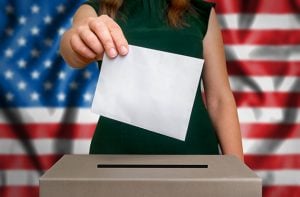
Should Courts Decide Who’s Eligible For The Ballot?
 Last month, the Colorado Supreme Court disqualified Donald Trump from having his name appear on ballots in the Republican primary. This caused a stir.
Last month, the Colorado Supreme Court disqualified Donald Trump from having his name appear on ballots in the Republican primary. This caused a stir. On the one hand, there was hysteria: “All of the justices on the Colorado Supreme Court were appointed by Democrats!” “The Republicans should hold a convention instead of a primary!” “We’ll run a write-in campaign for Trump!” “We’ll take to the streets!” “The United States Supreme Court will reverse!”
On the other hand, there was a different — less hysterical, but rational and common — reaction: “The Colorado decision is undemocratic!”
Of course it is. A court removed a candidate from a ballot. That’s undemocratic.
To lawyers, this shouldn’t matter. If a result is compelled by the United States Constitution, who cares if the result is (or is not) democratic? Presidents who have served two terms in office cannot run for a third; that’s undemocratic, but noncontroversial. People under 35, or who are not natural-born citizens, or who have not lived in the United States for the past 14 years cannot run for the presidency; that’s undemocratic, but noncontroversial.
To my eye, “undemocratic” doesn’t get you anywhere.
There’s yet a third point, however, that commentators have overlooked: Given the polluted nature of our national discourse, is it really so bad to have a nondemocratic check on our choices for president?
Think about what happens in an unfettered democratic system: People lie. And some part of the public believes those lies.
Fox News, for example, insisted that voting machines provided by Dominion Voting Systems had been rigged to steal the 2020 election from Trump. Perhaps you believed what Fox News told you. But Dominion then sued Fox for defamation, and the truth came out.
Lies are easy in normal conversation; lies are harder in court.
When people are unburdened by rules, they lie routinely. Who cares if what you say is true? There’s no punishment, and it’s of course imperative that your side prevail.
But when people are constrained by rules — rules of evidence, rules of procedure, rules of perjury — they lie less often.
In the case of Dominion against Fox, no witnesses were going to take an oath to tell the truth, put themselves at risk of imprisonment for perjury, subject themselves to cross-examination, and lie on the witness stand. Fox News has now admitted, in 787.5 million different ways, that it lied about Dominion’s voting machines. (Yeah, yeah: Fox settled, and in the settlement papers, Fox neither admitted nor denied Dominion’s allegations. That’s fine in court. But we know full well that Fox wouldn’t have paid Dominion $787.5 million if it expected to win at trial.) Voters, left to their own devices, might have believed Fox’s earlier lies and relied on them. But jurors in court would never hear those lies because witnesses wouldn’t repeat the lies under oath for fear of exposure and punishment.
Or maybe you listened to Rudy Giuliani, when he insisted that Georgia election workers Ruby Freeman and Shaye Moss had passed each other USB flash drives “like vials of heroin or cocaine” to steal Trump votes and assign them to Biden. You couldn’t be blamed for believing that crap. Giuliani was “America’s Mayor,” after all; surely, he wouldn’t lie to you.
But he did. Giuliani simply made up a story that wasn’t true because he wasn’t under oath. Once the judicial system started looking into the basis for Giuliani’s statements, Giuliani chose not to play: He violated discovery orders, was sanctioned by the court, and the jury ended up finding 148 million reasons for you to disbelieve what Giuliani had previously insisted was true.
So much for America’s Mayor.
Or how about Alex Jones? Perhaps you believed that the Sandy Hook massacre was a hoax, and those children had not been murdered. Alex Jones said so repeatedly; what’s not to believe?
But Jones wasn’t under oath, subject to cross-examination, and compelled to tell the truth. At trial, Jones was forced to admit that the Sandy Hook massacre was “100% real.” Remarkable: When no one is enforcing the truth, Jones spews whatever lies he cares to. When a court is imposing rules, Jones admits the truth and apologizes for having lied — and a jury nonetheless gave him 1.5 billion reasons to be more careful next time.
How about Lindsay Graham? In 2016, Graham apparently believed that Trump was a “race-baiting, xenophobic, religious bigot.” After Trump defeated Graham in the 2016 primary, Graham thought Trump was a fine, upstanding person. Indeed, Graham regularly golfed with Trump for the next four years. But after the insurrection of January 6, 2021, Graham’s opinion changed again: “All I can say is count me out. Enough is enough.”
OK; I’ll count Graham out.
No, wait! Now that Trump is again heading for the Republican presidential nomination, Graham has reversed course again: Trump’s a great guy!
It’s enough to make your head spin.
Last week, a book reported that Graham has said entirely different things when he’s under oath. Remarkable, huh? Testifying before a grand jury in Georgia, Graham said that “if you told Trump ‘that Martians came and stole the election,’ he’d probably believe you.” (Under oath, Graham also apparently testified that Trump cheats at golf.) Graham’s spokesman, naturally, denied the report — because the spokesman wasn’t under oath! Who cares if he lies?
Ultimately, the transcript of the grand jury proceeding, if it ever becomes public, will tell us what Graham really said. That transcript likely will contain the truth. The fear of going to jail for perjury will do that.
Did Trump sexually assault E. Jean Carroll? He denied it. Trump never met the woman; she wasn’t his type. In fact, Trump had his deposition taken in the Carroll defamation case, and he continued to deny that he had committed the assault. (Unlike most witnesses, Trump is apparently willing to lie under oath.) At his deposition, Trump was subject to cross-examination, and the jury could hear from witnesses to whom Carroll had reported the rape shortly after it occurred. In the first defamation trial, the jury rejected Trump’s lies and awarded Carroll $5 million. In the second trial, the jury on Friday awarded Carroll $83.3 million.
So let’s get back to the Colorado court system being undemocratic. Of course it is. But isn’t the lack of democracy the least of our problems? Isn’t it worse that, during election campaigns (and before, and after, and consistently), politicians lie with aplomb? Those lies will not be challenged, except by other lying politicians. There will be no cross-examination; there will be no penalties for intentional lies.
In court, as recent events have shown, people are less able to lie. Indeed, witnesses, such as Alex Jones, sometimes ‘fess up to their lies and beg forgiveness.
Isn’t the United States better off in some ways if a nondemocratic institution — the Colorado court system, for example — hears witnesses under oath, subject to cross-examination, and exposed to prompt rebuttal? Perhaps the result of that process would be comparatively more likely to yield the truth.
Or do we prefer a system in which politicians lie at whim to the public; when challenged, politicians repeat the lies more loudly and more insistently; and a percentage of the public casts votes in reliance on those lies?
Surely one could believe that an undemocratic system — perhaps a court system — is a useful part of the democratic process.
Shoot.
Okay, you purists: I know what you’re thinking. Who would sue whom for what? What facts would a jury decide? How is this possibly workable?
I concede that you have a point. But I’m howling at a different moon: Politicians lie to us all the time, and we then base our votes on those falsities. Isn’t anyone else outraged?
Mark Herrmann spent 17 years as a partner at a leading international law firm and is now deputy general counsel at a large international company. He is the author of The Curmudgeon’s Guide to Practicing Law and Drug and Device Product Liability Litigation Strategy (affiliate links). You can reach him by email at [email protected].
googletag.cmd.push( function() { // Display ad. googletag.display( "div-id-for-top-300x250" ); }); googletag.cmd.push( function() { // Display ad. googletag.display( "div-id-for-middle-300x250" ); }); googletag.cmd.push( function() { // Display ad. googletag.display( "div-id-for-bottom-300x250" ); }); Sponsored Sponsored 3 Ways AI Can Help Draft Legal Documents Faster Finish polished legal docs in Word with Lexis® Create. The AI-powered add-on leverages authoritative LexisNexis® content to help legal professionals intelligently draft and populate verifiable… From LexisNexis
Sponsored 3 Ways AI Can Help Draft Legal Documents Faster Finish polished legal docs in Word with Lexis® Create. The AI-powered add-on leverages authoritative LexisNexis® content to help legal professionals intelligently draft and populate verifiable… From LexisNexis  Sponsored The Future Of Professionals Report: How AI Is The Catalyst For Transforming Every Aspect Of Work 1,200 professionals weigh in on fulfilling the promise of artificial intelligence. From THOMSON REUTERS AND ABOVE THE LAW
Sponsored The Future Of Professionals Report: How AI Is The Catalyst For Transforming Every Aspect Of Work 1,200 professionals weigh in on fulfilling the promise of artificial intelligence. From THOMSON REUTERS AND ABOVE THE LAW  Sponsored How This Law Firm Converts 4x More Web Traffic Through Digital Transformation How making one simple change to their website, and no additional marketing spend drove 4x the number of qualified leads through their law firm’s website. From Lawbrokr
Sponsored How This Law Firm Converts 4x More Web Traffic Through Digital Transformation How making one simple change to their website, and no additional marketing spend drove 4x the number of qualified leads through their law firm’s website. From Lawbrokr  Sponsored The Solo & Small Firm Compensation Report Is Here! More than 1,000 small firm lawyers provide a glimpse into their pay. From iManage and Above The Law
Sponsored The Solo & Small Firm Compensation Report Is Here! More than 1,000 small firm lawyers provide a glimpse into their pay. From iManage and Above The Law  Sponsored The State Of Small Law Firms In An Era Of Change What are the most promising developments for gains in firm performance? From Thomson Reuters and Above the Law
Sponsored The State Of Small Law Firms In An Era Of Change What are the most promising developments for gains in firm performance? From Thomson Reuters and Above the Law  Sponsored The Solo & Small Firm Compensation Report Is Here! More than 1,000 small firm lawyers provide a glimpse into their pay. From iManage and Above The Law
Sponsored The Solo & Small Firm Compensation Report Is Here! More than 1,000 small firm lawyers provide a glimpse into their pay. From iManage and Above The Law  Sponsored The Future Of Professionals Report: How AI Is The Catalyst For Transforming Every Aspect Of Work 1,200 professionals weigh in on fulfilling the promise of artificial intelligence. From THOMSON REUTERS AND ABOVE THE LAW Topics
Sponsored The Future Of Professionals Report: How AI Is The Catalyst For Transforming Every Aspect Of Work 1,200 professionals weigh in on fulfilling the promise of artificial intelligence. From THOMSON REUTERS AND ABOVE THE LAW Topics Courts, Donald Trump, Government, Mark Herrmann
Introducing Jobbguru: Your Gateway to Career Success
The ultimate job platform is designed to connect job seekers with their dream career opportunities. Whether you're a recent graduate, a seasoned professional, or someone seeking a career change, Jobbguru provides you with the tools and resources to navigate the job market with ease.
Take the next step in your career with Jobbguru:
Don't let the perfect job opportunity pass you by. Join Jobbguru today and unlock a world of career possibilities. Start your journey towards professional success and discover your dream job with Jobbguru.
Originally posted on: https://abovethelaw.com/2024/01/should-courts-decide-whos-eligible-for-the-ballot/